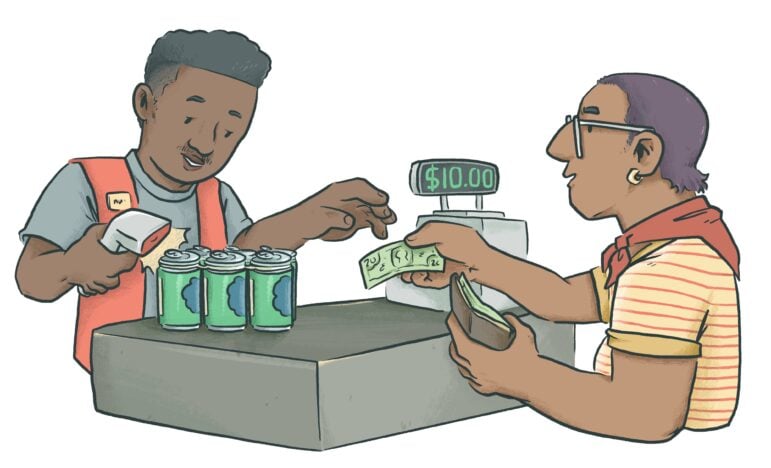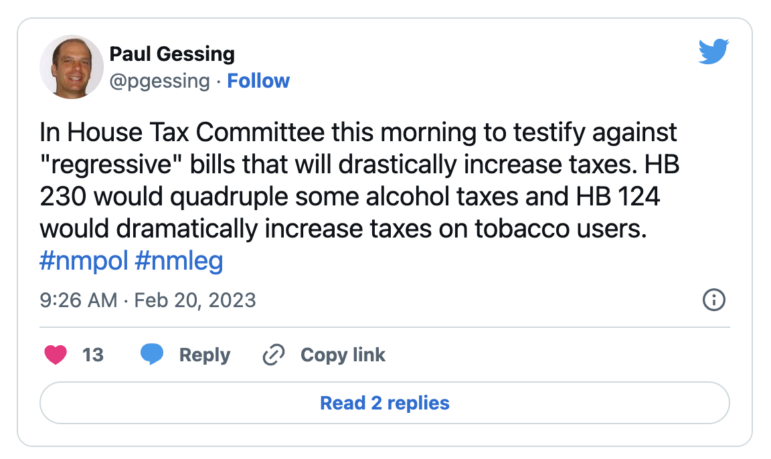
A bill that would raise state alcohol taxes for the first time in 30 years is in the hands of Democrats, who have a firm hold on both legislative chambers. But a major obstacle to passing the legislation is the concern voiced by some of their members about how an alcohol tax hike would affect low-income New Mexicans.
In an interim legislative meeting In October, Rep. Susan Herrera, a Democrat whose district in northern New Mexico has a higher share of residents in poverty than the state, said she refers to levies on alcohol and tobacco as ‘poor man’s taxes’ rather than as ‘sin taxes’.
“Not that I think poor people sin more than rich people,” she said, prompting laughter from her colleagues, “I just think they pay more for their sins.”

Business interests and conservatives are making the argument, too. On Monday as the House Taxation and Revenue Committee discussed House Bill 230, which would raise state alcohol taxes to a quarter a drink, Sam DeWitt of the national Brewers Association tarred the proposal as “regressive.” So did Paul Gessing, president of the local free market think tank The Rio Grande Foundation, and Adam Hoffer of the Washington, D.C.-based Tax Foundation.
Sen. Antoinette Sedillo-Lopez, a Democrat representing the south side of Albuquerque who is sponsoring companion legislation, insisted the measure is meant to improve the health of lower-income New Mexicans, not to impoverish them. “This bill is about changing behavior.”
Alcohol taxes are regressive by definition, according to former state tax policy director Kelly O’Donnell, at least from a technical standpoint. “The term is really specific,” she explained. “A ‘regressive’ tax is one that takes a larger percentage of income from lower income people.” That means any tax levied on a widely consumed good is regressive, whether it’s on alcohol, medical care, cigarettes, or gasoline, because it will be proportionately greater for poorer people.
But health economists say this is an overly simplistic way of appraising the different impact of alcohol taxes on poor and wealthy households.
Alcohol isn’t consumed in equal measure by people across the income spectrum, they point out. Contrary to conventional wisdom, drinking is more common among higher income than lower income people. A 2021 survey by the Centers for Disease Control and Prevention found that New Mexican adults with household incomes of more than $100,000 a year were twice as likely to report drinking in the last month as adults in households earning $25,000 or less. That means wealthy residents are more likely than poor ones to pay any alcohol taxes at all, since people who abstain pay nothing.
They also point out that alcohol imposes many costs above and beyond its sticker price on those who drink excessively — whether lost income due to missed days of work, medical expenses, or property damage sustained while intoxicated — and poor people are most exposed to them. Federal and state researchers calculated total alcohol-related costs in New Mexico to be $2.23 billion in 2010 ($3.22 billion in 2023 dollars), the costliest per drink consumed of any state.
Tobacco offers a useful comparison.
Like alcohol, tobacco is lawfully used by hundreds of millions of people around the world despite its adverse health consequences. That use, and subsequent illness, make poor people poorer, according to a monograph from the U.S. National Cancer Institute and the World Health Organization, by inflating smokers’ medical expenses and driving down their income.
Tobacco taxes, which the W.H.O. calls “the single most effective and cost-effective measure for reducing tobacco use,” are also instructive. Researchers estimate they account for 24% of the decline in smoking in the U.S. between 1965 and 2014, by increasing cigarette prices. And people with less income are more responsive to changes in price so tobacco taxes yield larger improvements in their health and household income than for their wealthier counterparts, according to Jeff Drope, a research professor and expert on economic policymaking the University of Illinois Chicago.
This makes such taxes “wildly progressive,” said Drope, “because the benefits accrue much, much more to those who quit or cut back, and those tend to be the folks in the lower socioeconomic group.”
Despite the research, opponents of tobacco taxes frequently try to label them as ‘anti-poor’, according to Matthew Myers, president of the advocacy group Campaign for Tobacco-Free Kids.
“The tobacco industry uses it all the time,” he said of the tactic, to the point his organization published a handout rebutting that specific claim. “It is the poor who are injured the most and pay out of pocket the most as the result of the harms caused by tobacco or alcohol,” he said, and they stand to benefit the most from measures to reduce consumption.
Left-leaning lawmakers in New Mexico have reason to focus on the tax-code. Because of the state’s reliance on consumption taxes, the overall tax system is regressive, according to the nonprofit New Mexico Voices for Children, although a raft of recent increases in tax credits and rebates somewhat reduced the tax burden on the poorest New Mexicans. Middle-class New Mexicans still pay a higher share of their income in state and local taxes than do the wealthiest New Mexicans.
This year, with a nearly $4 billion surplus, there is bipartisan interest in reforms that would make the tax-code less regressive by rolling some of those taxes back, including a bill introduced by Rep. Jason Harper, R-Rio Rancho, and endorsed by Gov. Michelle Lujan Grisham, that would reduce the state’s gross receipts tax by a quarter cent.
Just because a particular tax is regressive doesn’t mean it can’t be a part of a pro-poor agenda, according to Sharon Kayne, a spokesperson for New Mexico Voices for Children. The nonprofit has long supported increases in alcohol and tobacco taxes, she said, and voiced support for an alcohol tax increase during the Monday hearing.
“They are regressive taxes,” Kayne said, but for the most vulnerable New Mexicans, the “benefits outweigh the harms.”
Some lawmakers uneasy with raising alcohol taxes may be getting on board. Rep. Herrera texted that she “always” views such taxes as problematic but was “leaning towards supporting” House Bill 230.
But she may never get to vote on it. On Monday, the House tax committee temporarily declined to pass the bill, which Rep. Derrick Lente, a Democrat from Sandia Pueblo and chair of the committee, said was the usual practice for bills with a fiscal impact on the general fund or taxes.
Lente didn’t outright state his opposition to the bill, and it could still be considered in a comprehensive tax bill later in the session. But his pledge to continue talking with the sponsors after the end of the session seemed to some to spell its demise.
No tax is perfect, according to O’Donnell, because it inevitably distorts society’s purchasing behavior from what would be optimal. But she said alcohol taxes were “less harmful” than most.
“Frankly, you’re talking to somebody who thinks that we probably should raise the liquor excise tax,” she said.